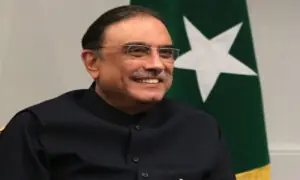Hundreds attend women’s day marches, counter-protests in Pakistan
4 min readHundreds of women rallied across Pakistan on Friday for International Women’s Day, a movement that often draws criticism from right-wing religious groups for its alleged Western influence.
Known as Aurat March, women turned out in major cities to highlight issues such as street harassment, bonded labour and lack of representation in parliament.
The organisers of Aurat March Islamabad accused the Islamabad Police of beating up the participants as they were marching towards D-Chowk from the Islamabad Press Club on Friday.
The participants of the March held protests in support of Palestine while dancing to the tune of Palestinian songs.
The march in Islamabad was held under the theme ‘Resistance and Hope’, in which participants were urged to bring Palestinian flags and wear keffiyeh.
“We face all sorts of violence: physical, sexual, cultural violence where women are exchanged to settle disputes, child marriages, rape, harassment in the workplace, on the streets,” said Farzana Bari, the lead organiser of Aurat March in Islamabad, where hundreds of women gathered to dance, chant and listen to speeches.
“People in Pakistan don’t get punished, there’s a culture of impunity.”
In Pakistan, just 21 per cent of women are in the workforce and less than 20 per cent of girls in rural areas are enrolled in secondary school, according to the United Nations.
Only 12 women were directly elected into parliament out of 266 seats in last month’s election.
Reports said that the ICT placed barbed wires at the site where Aurat March and Haya March were being held at the same time.
Later, Aurat March Islamabad in a video alleged that the police manhandled the participants and beat them up.

In the eastern city of Lahore around 400 women gathered, where organisers staged exhibitions in tribute to Afghan refugees and children killed in Gaza.
In Karachi, the Aurat March participants gathered at Fawar Chowk near Saddar Market. ‘Aurat Ehtajaji Mela and March’ was also organised in the city.
Several hundred also gathered in the southern city of Karachi, presenting an installation of fake shrouded corpses to evoke the victims of domestic violence.
Much of Pakistani society operates under a strict code of “honour”, with women beholden to their male relatives over choices around education, employment and who they can marry.
Prime Minister Shehbaz Sharif highlighted the importance of women and recalled Pakistani women and their contributions towards the country.
“Islam has provided equal rights to women for 14 centuries. Today, every woman is an important part of the society,” Shehbaz said in his message on Women’s day.
“Today, I mark this day for different women who provided different contributions. Fatima Jinnah’s political vision, Begum Rana Liaquat Ali’s services towards the country, Shaheed Benazir Bhutto’s sacrifice, Kulsoom Nawaz’s democratic struggle, Mohatarma Bilquis Edhi’s contribution to providing medical services and Malala’s pursuit for girls’ education is to be remembered,” he added.
He also said that his government would prioritise providing rights to women.
The Aurat March was organised in three separate cities across Pakistan.
Hundreds of women are killed by men in Pakistan every year for allegedly breaching this code.
Women supporters from right-wing religious parties also staged small counter-protests, known as modesty rallies, in Lahore and Karachi, holding banners calling for the protection of Islamic values.
In Islamabad, religious teacher Umm-e-Hassan – among a few dozen counter-protestors – accused the women’s day protestors of chanting “disgusting anti-Islamic slogans”.
“They are celebrating this day to get freedom from their fathers, brothers, husbands and sons,” she said.
The Aurat March dates back to 2018, when it was launched in Karachi but has since spread across most of the country.
The head of the Human Rights Commission of Pakistan said it “commends the resilience of working women in the face of harmful misogynistic attitudes and unprecedented economic instability”.
“However, it is gravely concerning that Pakistan continues to lag behind global economies in addressing chronic gender disparities,” added Asad Iqbal Butt.
The Aurat March is seen by critics as supporting elitist and Western values in the Muslim country, with organisers accused of disrespecting religious and cultural sensitivities.
In previous years, Aurat March organisers have had to battle in the courts for permission to hold demonstrations, while doctored images of banners held up by women have circulated online leading to harassment and death threats.
In 2020, groups of men turned up in vans and hurled stones at women participating in the Aurat March in Islamabad.
For the latest news, follow us on Twitter @Aaj_Urdu. We are also on Facebook, Instagram and YouTube.
























Comments are closed on this story.